By Artur Davis, on Fri Sep 23, 2011 at 8:30 AM ET  As a political instrument, the speech was effective and will pull Obama’s polling numbers back to an even approval/disapproval split: each element of the plan was poll-tested to cover the right bases, and the relatively non-conciliatory, “pass this now” tone will energize disaffected liberals. As economic policy, it is the 09 stimulus cut in half, and the parts of it that pass (extension of the payroll tax cuts, tax credits for new hires) will have a predictably mild stimulative effect. As a political instrument, the speech was effective and will pull Obama’s polling numbers back to an even approval/disapproval split: each element of the plan was poll-tested to cover the right bases, and the relatively non-conciliatory, “pass this now” tone will energize disaffected liberals. As economic policy, it is the 09 stimulus cut in half, and the parts of it that pass (extension of the payroll tax cuts, tax credits for new hires) will have a predictably mild stimulative effect.
But congressional Republicans have the votes to exact a price, and they will push Obama toward spending cuts that he does not want to make. They will not yield on taxes any more in the future than they have in the past because, frankly, they don’t need to: Obama has to have a jobs bill and will give ground on taxes to get it. Republicans know this.
Read the rest of…
Artur Davis: Will Obama’s Jobs Plan Work?
By Artur Davis, on Fri Sep 16, 2011 at 8:30 AM ET  This late summer should have been prime time for a centrist third party movement called Americans Elect. With Barack Obama’s approval ratings around 40 percent, and a profound fear that Republicans are too extreme and too un-serious to govern, the case for another political path is arguably being made by events. This late summer should have been prime time for a centrist third party movement called Americans Elect. With Barack Obama’s approval ratings around 40 percent, and a profound fear that Republicans are too extreme and too un-serious to govern, the case for another political path is arguably being made by events.
But unless you are an avid reader of Tom Friedman’s columns at the New York Times, or Matt Miller at the Washington Post, you’ve likely never heard of Americans Elect and their audacious plan to qualify for the 2012 ballot in all 50 states. They are well-heeled, based on starting capital from some major hedge-fund players; respectable enough to have caught the attention of serious people like Friedman and Miller; and essentially still an anonymous blip on the public radar.
 A major part of the skepticism is historical in nature – the last credible third party, the Progressives in 1912, had the virtue of being led by a popular ex president, and the updated versions have been regional demagogues or self-appointed provocateurs. Then there is the Nader factor – the experience that a third party often guarantees that the “evil”, rather than the “lesser of two evils”, wins. A major part of the skepticism is historical in nature – the last credible third party, the Progressives in 1912, had the virtue of being led by a popular ex president, and the updated versions have been regional demagogues or self-appointed provocateurs. Then there is the Nader factor – the experience that a third party often guarantees that the “evil”, rather than the “lesser of two evils”, wins.
All true. Yet, the national atmosphere lately has been unsettled enough that the past has ceased being the predictor of the future in politics. The grip of Democrats and Republicans on voter loyalty is weaker than it has traditionally been. We are also on the cusp of a double dip recession handmade by dysfunctional two-party politics.
Read the rest of…
Artur Davis: A Pathway for Americans Elect?
By Artur Davis, on Fri Sep 9, 2011 at 12:00 PM ET  There is no spot left for Sarah Palin in the starting lineup. The evangelical woman with a grassroots appeal to the party’s base? The unvarnished conservative who thrives on the liberal establishment’s disdain? Both roles are firmly taken. There is no spot left for Sarah Palin in the starting lineup. The evangelical woman with a grassroots appeal to the party’s base? The unvarnished conservative who thrives on the liberal establishment’s disdain? Both roles are firmly taken.
What should gall Palin is that it did not have to be this way. Neither Michele Bachmann nor Rick Perry were remotely plausible national figures a year ago, and they exist today because of ground that Palin was too unfocused to occupy.
 Palin doesn’t add up: she is a gifted stump speaker who still kept repeating her convention speech in 08 for months to crowds who had heard all the lines before; she frets about the establishment’s failure to take her governing skills seriously, but abandons a governorship that would have allowed her to burnish her credentials as a substantive reformer. She wonders why her toughness is questioned, then confesses that she left the governorship because she was worn down by ethics complaints from a gadfly. Palin doesn’t add up: she is a gifted stump speaker who still kept repeating her convention speech in 08 for months to crowds who had heard all the lines before; she frets about the establishment’s failure to take her governing skills seriously, but abandons a governorship that would have allowed her to burnish her credentials as a substantive reformer. She wonders why her toughness is questioned, then confesses that she left the governorship because she was worn down by ethics complaints from a gadfly.
Sarah Palin has formidable campaign talents, but none of the will to use those assets to gain power. That makes her reassuringly normal as a person, but it will never carry her anywhere near the presidency.
(Cross-posted, with permission of the author, from Politico’s Arena)
By Artur Davis, on Wed Sep 7, 2011 at 8:30 AM ET  Countless events will obviously reshape the answer to this question. But this is what should hearten Obama supporters about 2012: presidents in the modern era (post 1932) tend to be reelected, regardless of their political position a year out. And the three who have lost – Ford, Carter, and the first Bush – all overcame huge polling deficits and weak economies to become competitive in the final weeks. In fact, if Reagan and Carter don’t debate in the final week in ’80, and if Perot does not collapse the GOP base in ’92, as weak as they were, even Carter and Bush might have won. Countless events will obviously reshape the answer to this question. But this is what should hearten Obama supporters about 2012: presidents in the modern era (post 1932) tend to be reelected, regardless of their political position a year out. And the three who have lost – Ford, Carter, and the first Bush – all overcame huge polling deficits and weak economies to become competitive in the final weeks. In fact, if Reagan and Carter don’t debate in the final week in ’80, and if Perot does not collapse the GOP base in ’92, as weak as they were, even Carter and Bush might have won.
This, however, is what should keep Democratic strategists up at night: not counting blacks, Obama’s approval ratings have dipped dramatically with every sector of his 2008 majority, including Latinos, Jews, independents, white working class voters, and whites under 29. In other words, even if Obama achieves the 2008 turnout model, there is no guarantee that he will duplicate his ’08 demographic performance levels. And if he does not, he will have almost no margin for error.
(Cross-posted, with permission of the author, from Politico’s Arena)
By Artur Davis, on Fri Sep 2, 2011 at 8:30 AM ET  Michael Bloomberg is not running for president, but he is about to engage a presidential size problem -the intractable poverty and alienation of young black and Latino men in the inner city. Michael Bloomberg is not running for president, but he is about to engage a presidential size problem -the intractable poverty and alienation of young black and Latino men in the inner city.
The New York mayor has just announced a comprehensive campaign on several fronts, including the location of job recruitment centers within public housing complexes, revamping supervised release programs to confront recidivism, establishing parenting classes for new fathers, and most controversially, the city’s Education Department will be directed to factor in the performance and graduation rates of black and Latino boys in its annual assessment of schools. A school that lags in graduating black and Latino teenagers will now be at risk of being closed.
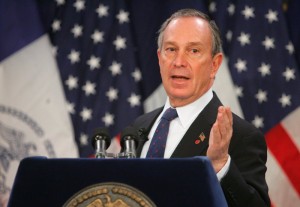 It is a smart strategy that is typical Bloomberg – funded two thirds by his own money and the money of his billionaire ally, George Soros, and one third by realigning public resources from less successful efforts; and unafraid to poke at some sacred cows in New York politics. As in most communities, the decision to close a school touches nerves, and Bloomberg’s accountability measures will shutter schools that can’t lift up their most vulnerable students. It is a smart strategy that is typical Bloomberg – funded two thirds by his own money and the money of his billionaire ally, George Soros, and one third by realigning public resources from less successful efforts; and unafraid to poke at some sacred cows in New York politics. As in most communities, the decision to close a school touches nerves, and Bloomberg’s accountability measures will shutter schools that can’t lift up their most vulnerable students.
Read the rest of…
Artur Davis: Bloomberg’s Campaign for Minority Men
By Artur Davis, on Thu Sep 1, 2011 at 8:30 AM ET  Let me damn Cornel West with some praise that is hardly faint: the Princeton philosopher writes with the lift of poetry even when he is describing something as unsentimental as the nature of American power. He also has the virtue of barbed honesty and has never let the lure of traveling among political princes and celebrities restrain his candor. Let me damn Cornel West with some praise that is hardly faint: the Princeton philosopher writes with the lift of poetry even when he is describing something as unsentimental as the nature of American power. He also has the virtue of barbed honesty and has never let the lure of traveling among political princes and celebrities restrain his candor.
Not surprisingly, those traits–candor and grace–explain why his essay in the New York Times on August 25, 2011, “Dr. King Weeps From His Grave”, has touched nerves in all manner of places.
West’s critique is best captured in one scathing, beautiful sentence: “the recent budget deal is only the latest phase of a 30 year, top-down, one-sided war against the poor and working people in the name of a morally bankrupt policy of deregulating markets, lowering taxes and cutting spending for those already socially neglected and economically abandoned”.
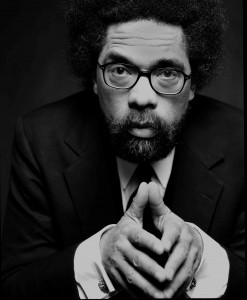 Dr. Cornel West These are arrows aimed at Republicans from Ronald Reagan to John Boehner for the contraction they have forced in the social contract, and at Democrats from Bill Clinton to Barack Obama, who in West’s view have left that contract too thinly defended and have done their own damage by trying too hard to sample conservative rhetoric on deficit reduction and taxes. To put a crescendo on the point, West, an early Obama supporter, calls the “age of Obama” a time that has “fallen tragically short of fulfilling King’s prophetic legacy”.
West is absolutely right about this much: the season of our first African American chief executive has most certainly not reshaped the foundations of our politics in the way that a million plus freezing bodies aligned on the National Mall on January 20, 2009 imagined it would. More Americans self-describe as conservative today, and fewer call themselves liberals, than on the day Obama shattered his glass ceiling, and the net effect is a nation that by roughly two to one leans right rather than left. That is not exactly, in West’s words, a place that sustains a “radical democratic vision.”
Read the rest of…
Artur Davis: King Would Have Understood Obama’s Civility
By Artur Davis, on Tue Aug 2, 2011 at 8:30 AM ET  Let’s get the obligatory observations out of the way first: avoiding a default on the debt ceiling was a necessity for an economy that in many respects is already lifeless. That economic reality, and the refusal of House Republicans to budge on their priorities, tied the hands of both President Obama and congressional Democrats. Let’s get the obligatory observations out of the way first: avoiding a default on the debt ceiling was a necessity for an economy that in many respects is already lifeless. That economic reality, and the refusal of House Republicans to budge on their priorities, tied the hands of both President Obama and congressional Democrats.
But politics grades results by who won and who lost, and on that core question, this is not close: The “compromise” reached Sunday night is a full-throated Democratic concession. It is a stunningly good deal for Republicans and the opposite for Barack Obama.
To take inventory, Republicans secured their most cherished priority by averting a rollback of corporate deductions or the expiration of the Bush tax cuts on the wealthy. Ten days ago, one or the other appeared to be within reach of Democratic negotiators. In addition, John Boehner and Mitch McConnell have installed a “trigger” for future cuts that will muddy the Democrats’ message on Medicare.
In fairness, it shouldn’t: There is a vast difference between handing over Medicare to the private insurance market, as all but four House Republicans voted to do earlier this year, and trimming the growth of provider subsidies. But Democrats failed miserably at making that case during the healthcare debate, when cuts to Medicare Advantage subsidies were ruthlessly, and effectively, turned against Democrats and there is no particular reason to think they will do better next year.
Republicans have also stripped Democrats of the additional discretionary spending they need to shore up their domestic priority list, including job training, education, and infrastructure. Nor did Republicans have to make a tradeoff by giving ground on extending unemployment benefits or the payroll tax cuts. It should gall Democrats even more that Republicans have had to pay no political price for their hostility to middle tax class tax relief and extra assistance to the unemployed–both deeply unpopular GOP stances that Democrats have utterly failed to exploit.
Read the rest of…
Artur Davis: A Breathtaking Comeback for Conservatism
By Artur Davis, on Fri Jul 29, 2011 at 12:30 PM ET  Until this week, Democrats were as split as Republicans over the debt ceiling endgame. But John Boehner has a far tougher task in keeping his party unified, and it is rooted in the very different political character of the rank and file membership within the House. Until this week, Democrats were as split as Republicans over the debt ceiling endgame. But John Boehner has a far tougher task in keeping his party unified, and it is rooted in the very different political character of the rank and file membership within the House.
A substantial part of the Democratic caucus consists of professional politicians who have climbed the ladder in a manner that makes them responsive to their party’s demands – they often won their first primaries by maneuvering to gain institutional support, and their ambitions invariably turn on the good graces of their party leadership. In turn, they are partisans first, ideologues second.
After the demise of the Blue Dogs in 2010, the remaining Democrats also represent disproportionately liberal districts where their pressure emanates from a base that scolds them for not doing enough to help President Obama.
In sharp contrast, a major part of the Republican caucus, particularly its massive freshman class, consists of relative newcomers who did not form ties by climbing the traditional ranks, and in many cases, won their primaries by overcoming their party establishment and their local versions of John Boehner. More of them owe their organizational strength to the Tea Party than to the local chamber of commerce.
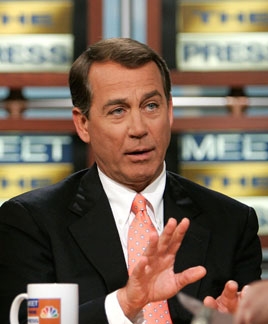 As a result, their ideological fervor shapes them much more than their party loyalty. Their hopes for advancement rest as much on carving out a profile with their party’s “movement conservatives” as it does currying favor on the Hill. Their external pressure arises from a base that loathes Barack Obama and grades them based on the intensity of their opposition to his agenda. As a result, their ideological fervor shapes them much more than their party loyalty. Their hopes for advancement rest as much on carving out a profile with their party’s “movement conservatives” as it does currying favor on the Hill. Their external pressure arises from a base that loathes Barack Obama and grades them based on the intensity of their opposition to his agenda.
Rallying the Democrats I describe to swallow a deal that is imperfect but “supports the President” is one thing; rallying the Republicans I describe to make an accommodation that cuts spending but salvages Obama is an infinitely harder mission. That is the reality that constrains John Boehner and it has the potential to wreck a deal even after one is reached.
(Cross-posted, with permission of the author, from Politico’s “Arena”)
By Artur Davis, on Wed Jul 27, 2011 at 12:30 PM ET  Based on my own observations in the House, I would have been stunned if you had told me Michele Bachmann would ever seriously contend for the presidency. Nothing about her abilities as a politician or legislator ever marked her as that kind of talent. Based on my own observations in the House, I would have been stunned if you had told me Michele Bachmann would ever seriously contend for the presidency. Nothing about her abilities as a politician or legislator ever marked her as that kind of talent.
But it does not require sympathy for her candidacy to be repelled by the ugliness and the venom of the whispering campaign that is underway against her. It proves first, that the liberal blogosphere is as crudely toxic as the right-wing blogosphere has always been.
Second, the coverage in mainstream media of unattributed allegations from individuals with an axe to grind is a dangerous lowering of the bar. Standards still have a role to play in the coverage of a presidential race, and some of those standards are being shredded in the zeal to “unmask” Bachmann.
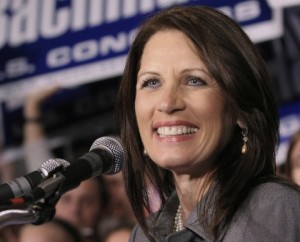 I think Michele Bachmann is on the verge of opening up a sizable lead in Iowa and that she is about to become an explosive online, grassroots fund-raising force in the next several months. If she wins Iowa, there is enough of a conservative base for her to compete effectively in New Hampshire, South Carolina, and Florida. I think Michele Bachmann is on the verge of opening up a sizable lead in Iowa and that she is about to become an explosive online, grassroots fund-raising force in the next several months. If she wins Iowa, there is enough of a conservative base for her to compete effectively in New Hampshire, South Carolina, and Florida.
But I am unconvinced that she can sweep those states and avoid a protracted three-month fight in the northern battleground states that she is not well-positioned to win. If Romney is still standing, he will be the choice of an establishment and a traditional donor base that doubts Bachmann’s elecability and suspects that she jeopardizes the Republican hold on the House, and the drumbeat against her general election vulnerability will take a toll.
The defining question: if Bachmann is surging early next year, is she running competitively in the polls with Barack Obama or not? If she is the nomination will be within her reach; if not it simply won’t happen.
(Cross-posted, with permission of the author, from Politico’s Arena)
By Artur Davis, on Thu Jul 21, 2011 at 8:30 AM ET  The 2012 election will be breathtakingly expensive. President Obama has plausibly set his sights on raising a billion dollars, and the eventual Republican nominee will not be impoverished, given the antipathy toward Obama’s policies in some of the richest precincts in America. The 2012 election will be breathtakingly expensive. President Obama has plausibly set his sights on raising a billion dollars, and the eventual Republican nominee will not be impoverished, given the antipathy toward Obama’s policies in some of the richest precincts in America.
The flood of money will disturb advocates of campaign finance reform. But the Supreme Court’s recent ruling in Arizona Free Enterprise Club v. Bennett suggests that there is little even a reform-minded Congress or state legislature could do to stem the tide. Bennett involved a First Amendment challenge to Arizona’s system of public financing for state candidates: under the law, candidates are permitted to opt in or out of a pool that provides public funds for candidates who accept spending limits. For publicly funded candidates who find themselves facing certain expenditure levels by their privately financed opponents, or groups who back them, Arizona’s law furnished extra matching funds. Its principle is that speech by deep pocketed candidates should not be limited but that the public has a major stake in leveling the playing field.
 Chief Justice Roberts’ majority opinion reminds that the Court has long considered campaign spending to be protected speech. Roberts reasoned that the Arizona law in effect “burdens” privately financed candidates by putting a de facto penalty on their speech. According to the Chief Justice, this burden does not just level the field, it has the effect of actually “reducing” the speech of the deep pockets. Chief Justice Roberts’ majority opinion reminds that the Court has long considered campaign spending to be protected speech. Roberts reasoned that the Arizona law in effect “burdens” privately financed candidates by putting a de facto penalty on their speech. According to the Chief Justice, this burden does not just level the field, it has the effect of actually “reducing” the speech of the deep pockets.
The newest member of the Court, Elena Kagan, was almost caustic in her dissent. Justice Kagan’s point was that Arizona hardly restricts the speech of big spending candidates; what it does instead is to thwart their ability to dominate the field. Challenging the majority’s viewpoint that Arizona can’t impose its own view of fairness over the speech rights of certain candidates, Kagan recites the familiar rationale that too much private money in politics is corrupting and governments have a compelling interest in countering that influence.
Read the rest of…
Artur Davis: The Breathtakingly Expensive 2012 Election
|
|
 As a political instrument, the speech was effective and will pull Obama’s polling numbers back to an even approval/disapproval split: each element of the plan was poll-tested to cover the right bases, and the relatively non-conciliatory, “pass this now” tone will energize disaffected liberals. As economic policy, it is the 09 stimulus cut in half, and the parts of it that pass (extension of the payroll tax cuts, tax credits for new hires) will have a predictably mild stimulative effect.
As a political instrument, the speech was effective and will pull Obama’s polling numbers back to an even approval/disapproval split: each element of the plan was poll-tested to cover the right bases, and the relatively non-conciliatory, “pass this now” tone will energize disaffected liberals. As economic policy, it is the 09 stimulus cut in half, and the parts of it that pass (extension of the payroll tax cuts, tax credits for new hires) will have a predictably mild stimulative effect.




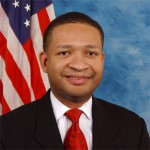
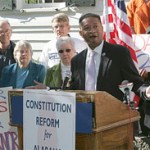









Follow Artur: